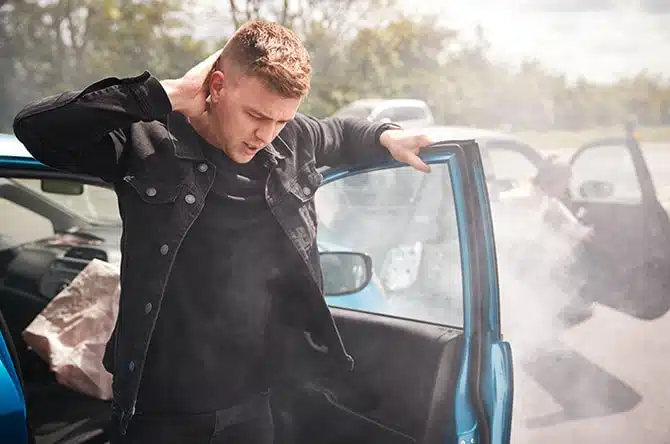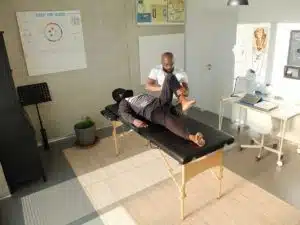
According to the NHTSA, approximately 2.4 million injuries and deaths occur from car accidents, which include soft tissue injuries. While they may be classified as nondisabling, they can still lead to significant pain, discomfort, and limited mobility if left untreated. Eventually, these injuries can diminish the quality of your life.
Exploring effective treatments like chiropractic care is essential. Unlike other options, chiropractic care for soft tissue injuries is natural, noninvasive, and holistic. If you want to avoid long-term pain, complications, or reliance on medications, consider chiropractic options to support your recovery.
Let’s explore the characteristics of soft tissue injuries and how chiropractic treatment can effectively address them.
Soft tissue injuries refer to damage to the body’s connective tissues—that is, muscles, tendons, and ligaments. Often, they are caused by sudden and forceful impacts that overstretch or tear the tissues.
The following are common symptoms linked with soft tissue injuries after a car accident:
Without proper treatment, soft tissue injuries can take weeks or months to heal. It’s crucial to seek prompt and professional care following an accident to prevent complications, particularly chronic pain or permanent mobility issues.
Whiplash is one of the most common car accident soft tissue injuries, with 83% of patients in the US at risk of chronic disability. Sudden head flicks can cause this and damage the neck’s muscles and ligaments. The pain and stiffness may not hit you immediately but can arise shortly afterward.
The impact of a collision can overstretch or tear your muscles or tendons, causing pain and restricted movement. This condition is called a muscle strain or a pulled muscle, commonly occurring in the lower back and hamstrings (back thigh muscles).
The ligaments that connect your bones can strain and rupture from sudden trauma, like car accidents, resulting in a sprain. Ligament sprains are common, especially in the knee and ankle (although they can occur anywhere in your body).
Blunt force trauma from impacts, such as a collision or seatbelt pressure, can rupture blood vessels. This leads to bruising and tenderness in the affected area as blood leaks into the surrounding tissue, causing discoloration and soreness.
Tendons, the soft tissues that connect muscles to bones and facilitate joint movement, can tear under the force of an accident, often requiring specialized care. Tendon tears can occur almost anywhere a tendon connects a bone to a muscle.

Chiropractors consider the whole person—physically, mentally, and emotionally—to address soft tissue injuries. They assess not only the issue but also the patient’s lifestyle, habits, and overall health. Treatment plans often include chiropractic techniques, exercise recommendations, lifestyle changes, and nutritional guidance. This comprehensive care creates a supportive environment and empowers patients to achieve long-term wellness and prevent future injuries.
Chiropractic care has been studied for its effectiveness in treating various soft tissue injuries. Here are some findings:
Now that you’ve learned the potential benefits of chiropractic treatment after car accidents, let’s explore the various techniques used to treat soft tissue injuries.
Chiropractic adjustments entail gently aligning the spine and adjusting joints to relieve pain and improve function. Chiropractors use techniques like the Activator Method or the Gonstead system to address soft tissue injuries. These ease pressure on the affected areas, particularly in whiplash cases.
The name of this technique perfectly explains it: soft tissue therapy is intended to focus on muscles, tendons, ligaments, and other connective tissues. Techniques like myofascial release and massage therapy relax tight muscles, relieve spasms, and release tension, resulting in better circulation, reduced inflammation, and healing.
One study revealed that soft tissue techniques are often combined with rehabilitation exercises to better treat injuries. Exercises such as bridges, planks, hamstring stretches, neck stretches, or step-ups complement treatment plans, specifically aiding in strengthening muscles, improving flexibility, and preventing further injuries.
Ultrasound therapy is a noninvasive option that uses sound waves to penetrate deep into damaged tissues, reducing inflammation, enhancing motion range, and promoting healing for car accident injuries.
EMS uses electrical impulses to make muscles contract and relax. This process helps alleviate pain, reduce inflammation, and promote muscle recovery after an accident. By stimulating the muscles, EMS improves blood flow and encourages healing, making it a beneficial therapy for individuals recovering from injuries.
Heat therapy involves applying heat to the body using a hot cloth, hot water, ultrasound, heating pad, hydrocollator packs, whirlpool baths, or infrared heat therapy to treat soft tissue injuries. This heat increases blood flow and relaxes muscles, which relieves pain and accelerates recovery.

Seeking early chiropractic soft tissue injury treatment is crucial for effectively addressing issues before they worsen and for enhancing overall well-being.
An injury is an injury regardless of severity, especially if it resulted from a car accident. It's important to take soft tissue injuries seriously and get the proper care for the best recovery.
Choosing chiropractic care can promote effective healing and help prevent long-term problems without requiring invasive procedures. Furthermore, it focuses not only on the symptoms but also on the underlying causes and factors that influence recovery.
Experiencing persistent stiffness or soreness? Seek chiropractic care for soft tissue injuries at North East Chiropractic Center. Our New Haven, Leo, Grabill, Huntertown, and Fort Wayne doctors specialize in the best chiropractic techniques for soft tissue injuries and provide personalized treatment plans for your needs.
Monday 8:30am – 6:00pm
Tuesday 9:00am – 4:30pm
Wednesday 8:30am – 6:00pm
Thursday 8:30am – 6:00pm
Friday 9:00am – 4:00pm
Saturday 8:30am – 12:30pm
Sunday Closed